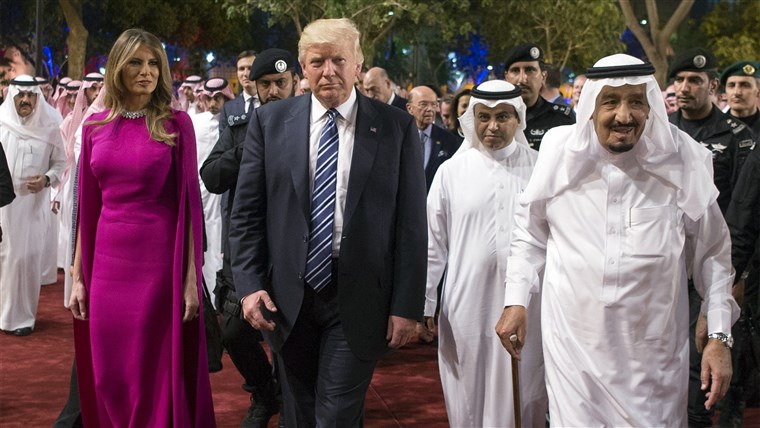A mutual historic partnership that has shown its resilience
https://arab.news/nv2se

The strength of US-Saudi bilateral relations has ebbed and flowed over seven decades, but they have without a doubt managed to overcome a number of obstacles over the years. It is a relationship that has been anchored on common security interests and personal bonds between leaders. A partnership forged in the dying days of World War II, the bond built between US President Franklin D. Roosevelt with Saudi King Abdul Aziz came at a time when a new international order was emerging, and new security threats would evolve over the coming years. That the relationship has only strengthened in scope and scale in the wake of the 9/11 terror strikes — where America faced its deadliest attack on home soil since Pearl Harbor — speaks volumes on its resilience.
As former defense analyst in the US Department of Defense with nearly a decade in service and multiple deployments to combat zones in the Middle East and South Asia, it was clear to me that US military strategists and diplomats would not be able to successfully tackle the threat of transnational terror networks and state-sponsored terror without the help of Arab and Muslim allies. Common concerns over Islamist-inspired terror and Iranian hegemonic aspirations have become a common rallying cry for the US and the Kingdom. More recently, tectonic shifts in the political and social orders of the region have also underscored strategic cooperation between American and Saudi policymakers.
President Trump’s administration has clearly charted a policy path to strengthen defense ties with the Kingdom. And while defense and security cooperation has typically been a bipartisan affair, it would not be hyperbole to describe the Trump administration as having essentially “doubled down” on foreign military sales and various tools for joint defense.
According to the Congressional Research Service: “Since 2009, the executive branch has notified Congress of proposed foreign military sales to Saudi Arabia of major defense articles and services with a potential aggregate value of nearly $139 billion.”
The two countries also found themselves in the common crosshairs of Qassem Soleimani’s vast regional network of proxies and Iran’s growing missile arsenal. The cruise missile attack on the Saudi homeland targeting Aramco’s strategic oil fields and the Iranian missile attack on the US Al-Asad airbase in Iraq highlighted the urgency of establishing a common defense front.
The deployment of advanced missile defense systems, ground troops and fighter-jet squadrons to Riyadh on President Trump’s orders delivered a loud and clear message of deterrence to Iran at a critical time when the Iranian Revolutionary Guards have been attempting to gauge how much they could get away with in terms of destabilizing activity in the region. After all, Soleimani did not differentiate between targeting Americans or Arabs — indeed, he targeted anyone who stood in the way of the Revolutionary Guards’ mission of establishing a region-wide system under Ayatollah Khamenei’s tutelage. The strong security bilateral security link has served as a force multiplier for the US presence in the Arabian Gulf to deter and counter the attempted misadventures of Soleimani’s Revolutionary Guards which threaten the freedom and wellbeing of millions across the Arab world.
And while for a brief time it seemed that the US Congress would put a hold on a significant portion of US military sales and support to the Kingdom in the wake of the Khashoggi tragedy, the strategic partnership that FDR and King Abdul Aziz built is being reinforced by Donald Trump and King Salman.
In the inaugural foreign visit as head of state that he made to Riyadh in 2017, President Trump outlined a foreign policy vision calling for Muslim-majority countries to take the lead in combatting radicalization. He said: “Above all we must be united in pursuing the one goal that transcends every other consideration. That goal is to meet history’s great test—to conquer extremism and vanquish the forces of terrorism.”
And it has been a call that has been met from the Saudi Grand Mufti’s historic pronouncement of extremists to be the “first enemies of Muslims” to unprecedented agreements to share the burden of the investments in countering common security threats.
President Trump’s administration has clearly charted a policy path to strengthen defense ties with the Kingdom.
Oubai Shahbandar
It is a historic test that, like two old friends who have weathered many storms together in the trenches, has only strengthened the unity of our two countries. President Trump’s message of the urgency and strategic importance of the custodian of the two holy mosques being at the forefront of the fight that affects American and Arab security interests alike has resonated deeply in the Arabian Peninsula. And no matter how much military hardware or intelligence platforms that the US deploys over the years, without the spread of good governance and the responsible recognition of the desires of the millions of Arab youth calling for a better future no battlefield gain will be sustainable.
American men and women have been on the frontlines for well over a decade in the Middle East (nearly two in Afghanistan). Their missions cannot be accomplished alone. And more and more, Washington policy circles have come to terms with the reality that the historical partnership with the Kingdom will have to endure, despite the naysayers.
And so, a meeting that began on an American warship in the Suez on the eve of the great Allied victory over global fascism continues to pay dividends to this day.
- Oubai Shahbandar is a Syrian-American former Middle East Pentagon analyst.







































